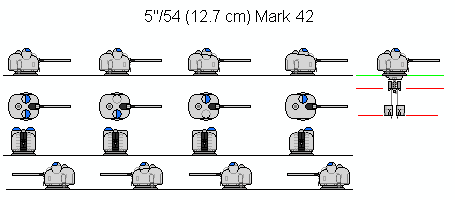Difference between revisions of "5''/54 Mark 42"
Acelanceloet (talk | contribs) m (→Used on) |
Acelanceloet (talk | contribs) m |
||
| Line 2: | Line 2: | ||
== History == | == History == | ||
| − | The Mk 42 was the standard US Navy Single 5'' gun mount of the post WW-II era. It was developed as a replacement for the 5''/38 twin mount, firing as fast as both guns in that mounting combined with an more powerful round. The gun was developed from the [[5 | + | The Mk 42 was the standard US Navy Single 5'' gun mount of the post WW-II era. It was developed as a replacement for the 5''/38 twin mount, firing as fast as both guns in that mounting combined with an more powerful round. The gun was developed from the [[5"/38 Mark 12]] and the [[5''/54 Mark 39|5''/54 Mark 16]] and shared similar features such as the vertically sliding breech block and the interrupted-screw (bayonet joint) barrel mounting. This weapon is alternatively fed from right and left ammunition drums. These are independent systems feeding a single breech and barrel, effectively creating 1.5 guns. |
Most Mark 42 mounts originally had two local control domes, one on each side. The one on the right was fitted for anti-aircraft and the one on the left was for surface firing. Many of the AA domes were removed in the 1960-70s as local control against high-speed aircraft was considered to be nearly impossible. | Most Mark 42 mounts originally had two local control domes, one on each side. The one on the right was fitted for anti-aircraft and the one on the left was for surface firing. Many of the AA domes were removed in the 1960-70s as local control against high-speed aircraft was considered to be nearly impossible. | ||
Latest revision as of 06:47, 7 May 2021
History
The Mk 42 was the standard US Navy Single 5 gun mount of the post WW-II era. It was developed as a replacement for the 5/38 twin mount, firing as fast as both guns in that mounting combined with an more powerful round. The gun was developed from the 5"/38 Mark 12 and the 5/54 Mark 16 and shared similar features such as the vertically sliding breech block and the interrupted-screw (bayonet joint) barrel mounting. This weapon is alternatively fed from right and left ammunition drums. These are independent systems feeding a single breech and barrel, effectively creating 1.5 guns.
Most Mark 42 mounts originally had two local control domes, one on each side. The one on the right was fitted for anti-aircraft and the one on the left was for surface firing. Many of the AA domes were removed in the 1960-70s as local control against high-speed aircraft was considered to be nearly impossible.
The firing rate was somewhat reduced over the lifetime of the mounting due to jamming issues. Later upgrades raised the RoF again, but not as high as the original figure.
The Mk 42 was first used in CLC-1 Northampton, commissioned in 1953.
Used on
- CLC-1 Northampton
- Mitscher class
- Forrest Sherman class
- Charles F. Adams class
- Farragut class
- Belknap class
- CGN-35 Truxtun
- Knox class
- Forrestal class
- Tachikaze class
- Takatsuki class
- Shirane class
- Haruna class
- Perth class
- Baleares class
- Lütjens class
Affiliated systems
Part description
The part is drawn in 4 variations, from left to right:
- with 2 control cupola's
- with the left fire control cupola removed
- with the right fire control cupola removed
- constructed without the left cupola.
In addition, at the right there is also an drawing made of the belowdeck components of the Mk 42 gun.
of all variants, an right, left, top and front view is drawn.
